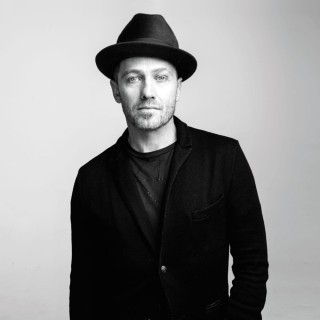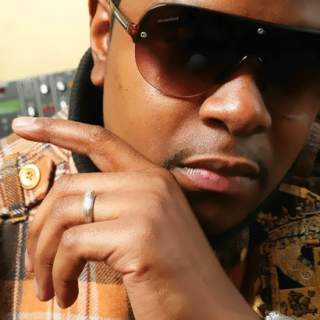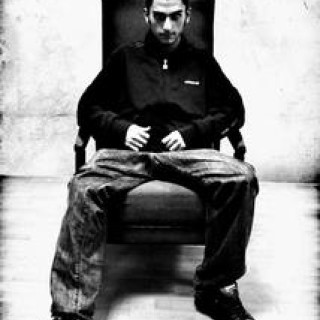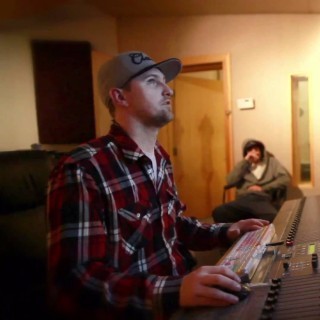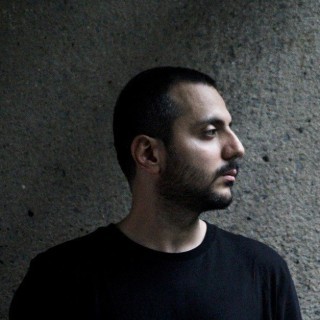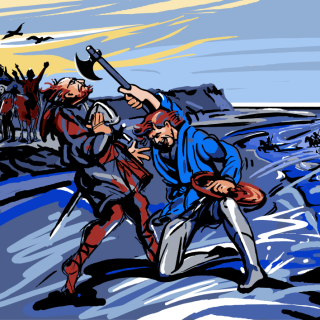
48
Poetry
Tekst piosenki
CHAPTER XLVI.
OF GIZUR THE WHITE AND GEIR THE PRIEST.
There was a man named Gizur the White; he was Teit's son; Kettlebjorn
the Old's son, of Mossfell. Gizur the White kept house at Mossfell, and
was a great chief. That man is also named in this story, whose name was
Geir the priest; his mother was Thorkatla, another daughter of
Kettlebjorn the Old of Mossfell. Geir kept house at Lithe. He and Gizur
backed one another in every matter. At that time Mord Valgard's son kept
house at Hof on the Rangrivervales; he was crafty and spiteful. Valgard
his father was then abroad, but his mother was dead. He was very envious
of Gunnar of Lithend. He was wealthy, so far as goods went, but had not
many friends.
CHAPTER XLVII.
OF OTKELL IN KIRKBY.
There was a man named Otkell; he was the son of Skarf, the son of
Hallkell, who fought with Gorm of Gormness, and felled him on the
holm.[22] This Hallkell and Kettlebjorn the Old were brothers.
Otkell kept house at Kirkby; his wife's name was Thorgerda; she was a
daughter of Mar, the son of Runolf, the son of Naddad of the Faroe
isles. Otkell was wealthy in goods. His son's name was Thorgeir; he was
young in years, and a bold dashing man.
Skamkell was the name of another man; he kept house at another farm
called Hof; he was well off for money, but he was a spiteful man and a
liar; quarrelsome too, and ill to deal with. He was Otkell's friend.
Hallkell was the name of Otkell's brother; he was a tall strong man, and
lived there with Otkell; their brother's name was Hallbjorn the White;
he brought out to Iceland a thrall, whose name was Malcolm; he was Irish
and had not many friends.
Hallbjorn went to stay with Otkell, and so did his thrall Malcolm. The
thrall was always saying that he should think himself happy if Otkell
owned him. Otkell was kind to him, and gave him a knife and belt, and a
full suit of clothes, but the thrall turned his hand to any work that
Otkell wished.
Otkell wanted to make a bargain with his brother for the thrall; he said
he would give him the thrall, but said too, that he was a worse treasure
than he thought. And as soon as Otkell owned the thrall, then he did
less and less work. Otkell often said outright to Hallbjorn, that he
thought the thrall did little work; and he told Otkell that there was
worse in him yet to come.
At that time came a great scarcity, so that men fell short both of meat
and hay, and that spread over all parts of Iceland. Gunnar shared his
hay and meat with many men; and all got them who came thither, so long
as his stores lasted. At last it came about that Gunnar himself fell
short both of hay and meat. Then Gunnar called on Kolskegg to go along
with him; he called too on Thrain Sigfus' son, and Lambi Sigurd's son.
They fared to Kirkby, and called Otkell out. He greeted them, and Gunnar
said, "It so happens that I am come to deal with thee for hay and meat,
if there be any left".
Otkell answers, "There is store of both, but I will sell thee neither".
"Wilt thou give me them then," says Gunnar, "and run the risk of my
paying thee back somehow?"
"I will not do that either," says Otkell.
Skamkell all the while was giving him bad counsel.
Then Thrain Sigfus' son said, "It would serve him right if we take both
hay and meat and lay down the worth of them instead".
Skamkell answered, "All the men of Mossfell must be dead and gone then,
if ye, sons of Sigfus, are to come and rob them".
"I will have no hand in any robbery," says Gunnar.
"Wilt thou buy a thrall of me?" says Otkell.
"I'll not spare to do that," says Gunnar. After that Gunnar bought the
thrall, and fared away as things stood.
Njal hears of this, and said, "Such things are ill done, to refuse to
let Gunnar buy; and it is not a good outlook for others if such men as
he cannot get what they want".
"What's the good of thy talking so much about such a little matter?"
says Bergthora; "far more like a man would it be to let him have both
meat and hay, when thou lackest neither of them."
"That is clear as day," says Njal, "and I will of a surety supply his
need somewhat."
Then he fared up to Thorolfsfell, and his sons with him, and they bound
hay on fifteen horses; but on five horses they had meat. Njal came to
Lithend, and called Gunnar out. He greeted them kindly.
"Here is hay and meat," said Njal, "which I will give thee; and my wish
is, that thou shouldst never look to any one else than to me if thou
standest in need of any thing."
"Good are thy gifts," says Gunnar, "but methinks thy friendship is still
more worth, and that of thy sons."
After that Njal fared home, and now the spring passes away.
CHAPTER XLVIII.
HOW HALLGERDA MAKES MALCOLM STEAL FROM KIRKBY.
Now Gunnar is about to ride to the Thing, but a great crowd of men from
the Side east turned in as guests at his house.
Gunnar bade them come and be his guests again, as they rode back from
the Thing; and they said they would do so.
Now they ride to the Thing, and Njal and his sons were there. That Thing
was still and quiet.
Now we must take up the story, and say that Hallgerda comes to talk with
Malcolm the thrall.
"I have thought of an errand to send thee on," she says; "thou shalt go
to Kirkby."
"And what shall I do there?" he says.
"Thou shalt steal from thence food enough to load two horses, and mind
and have butter and cheese; but thou shalt lay fire in the storehouse,
and all will think that it has arisen out of heedlessness, but no one
will think that there has been theft."
"Bad have I been," said the thrall, "but never have I been a thief."
"Hear a wonder!" says Hallgerda, "thou makest thyself good, thou that
hast been both thief and murderer; but thou shalt not dare to do aught
else than go, else will I let thee be slain."
He thought he knew enough of her to be sure that she would so do if he
went not; so he took at night two horses and laid pack-saddles on them,
and went his way to Kirkby. The house-dog knew him and did not bark at
him, and ran and fawned on him. After that he went to the storehouse and
loaded the two horses with food out of it, but the storehouse he burnt,
and the dog he slew.
He went up along by Rangriver, and his shoe-thong snapped; so he takes
his knife and makes the shoe right, but he leaves the knife and belt
lying there behind him.
He fares till he comes to Lithend; then he misses the knife, but dares
not to go back.
Now he brings Hallgerda the food, and she showed herself well pleased at
it.
Next morning when men came out of doors at Kirkby there they saw great
scathe. Then a man was sent to the Thing to tell Otkell, he bore the
loss well, and said it must have happened because the kitchen was next
to the storehouse; and all thought that that was how it happened.
Now men ride home from the Thing, and many rode to Lithend. Hallgerda
set food on the hoard, and in came cheese and butter. Gunnar knew that
such food was not to be looked for in his house, and asked Hallgerda
whence it came?
"Thence," she says, "whence thou mightest well eat of it; besides, it is
no man's business to trouble himself with housekeeping."
Gunnar got wroth and said, "Ill indeed is it if I am a partaker with
thieves"; and with that he gave her a slap on the cheek.
She said she would bear that slap in mind and repay it if she could.
So she went off and he went with her, and then all that was on the board
was cleared away, but flesh-meat was brought in instead, and all thought
that was because the flesh was thought to have been got in a better way.
Now the men who had been at the Thing fare away.
CHAPTER XLIX.
OF SKAMKELL'S EVIL COUNSEL.
Now we must tell of Skamkell. He rides after some sheep up along
Rangriver, and he sees something shining in the path. He finds a knife
and belt, and thinks he knows both of them. He fares with them to
Kirkby; Otkell was out of doors when Skamkell came. He spoke to him and
said--
"Knowest thou aught of these pretty things?"
"Of a surety," says Otkell, "I know them."
"Who owns them?" asks Skamkell.
"Malcolm the thrall," says Otkell.
"Then more shall see and know them than we two," says Skamkell, "for
true will I be to thee in counsel."
They showed them to many men, and all knew them. Then Skamkell said--
"What counsel wilt thou now take?"
"We shall go and see Mord Valgard's son," answers Otkell, "and seek
counsel of him."
So they went to Hof, and showed the pretty things to Mord, and asked him
if he knew them?
He said he knew them well enough, but what was there in that? "Do you
think you have a right to look for anything at Lithend?"
"We think it hard for us," says Skamkell, "to know what to do, when such
mighty men have a hand in it."
"That is so, sure enough," says Mord, "but yet I will get to know those
things out of Gunnar's household, which none of you will ever know."
"We would give thee money," they say, "if thou wouldst search out this
thing."
"That money I shall buy full dear," answered Mord, "but still, perhaps,
it may be that I will look at the matter."
They gave him three marks of silver for lending them his help.
Then he gave them this counsel, that women should go about from house to
house with small wares, and give them to the housewives, and mark what
was given them in return.
"For," he says, "'tis the turn of mind of all men first to give away
what has been stolen, if they have it in their keeping, and so it will
be here also, if this hath happened by the hand of man. Ye shall then
come and show me what has been given to each in each house, and I shall
then be free from further share in this matter, if the truth comes to
light."
To this they agreed, and went home afterwards.
Mord sends women about the country, and they were away half a month.
Then they came back, and had big bundles. Mord asked where they had most
given them?
They said that at Lithend most was given them, and Hallgerda had been
most bountiful to them.
He asked what was given them there?
"Cheese," say they.
He begged to see it, and they showed it to him, and it was in great
slices. These he took and kept.
A little after, Mord fared to see Otkell, and bade that he would bring
Thorgerda's cheese-mould; and when that was done, he laid the slices
down in it, and lo! they fitted the mould in every way.
Then they saw, too, that a whole cheese had been given to them.
Then Mord said, "Now may ye see that Hallgerda must have stolen the
cheese"; and they all passed the same judgment; and then Mord said, that
now he thought he was free of this matter.
After that they parted.
Shortly after Kolskegg fell to talking with Gunnar, and said--
"Ill is it to tell, but the story is in every man's mouth, that
Hallgerda must have stolen, and that she was at the bottom of all that
great scathe that befell at Kirkby."
Gunnar said that he too thought that must be so. "But what is to be done
now?"
Kolskegg answered, "That wilt think it thy most bounden duty to make
atonement for thy wife's wrong, and methinks it were best that thou
farest to see Otkell, and makest him a handsome offer."
"This is well spoken," says Gunnar, "and so it shall be."
A little after Gunnar sent after Thrain Sigfus' son, and Lambi Sigurd's
son, and they came at once.
Gunnar told them whither he meant to go, and they were well pleased.
Gunnar rode with eleven men to Kirkby, and called Otkell out. Skamkell
was there too, and said, "I will go out with thee, and it will be best
now to have the balance of wit on thy side. And I would wish to stand
closest by thee when thou needest it most, and now this will be put to
the proof. Methinks it were best that thou puttest on an air of great
weight."
Then they, Otkell and Skamkell, and Hallkell and Hallbjorn, went out all
of them.
They greeted Gunnar, and he took their greeting well. Otkell asks
whither he meant to go?
"No farther than here," says Gunnar, "and my errand hither is to tell
thee about that bad mishap--how it arose from the plotting of my wife
and that thrall whom I bought from thee."
"'Tis only what was to be looked for," says Hallbjorn.
"Now I will make thee a good offer," says Gunnar, "and the offer is
this, that the best men here in the country round settle the matter."
"This is a fair-sounding offer," said Skamkell, "but an unfair and
uneven one. Thou art a man who has many friends among the householders,
but Otkell has not many friends."
"Well," says Gunnar, "then I will offer thee that I shall make an award,
and utter it here on this spot, and so we will settle the matter, and my
good-will shall follow the settlement. But I will make thee an atonement
by paying twice the worth of what was lost."
"This choice shalt thou not take," said Skamkell; "and it is unworthy to
give up to him the right to make his own award, when thou oughtest to
have kept it for thyself."
So Otkell said, "I will not give up to thee, Gunnar, the right to make
thine own award."
"I see plainly," said Gunnar, "the help of men who will be paid off for
it one day I daresay; but come now, utter an award for thyself."
Otkell leant toward Skamkell and said, "What shall I answer now?"
"This thou shalt call a good offer, but still put thy suit into the
hands of Gizur the white, and Geir the priest, and then many will say
this, that thou behavest like Hallkell, thy grandfather, who was the
greatest of champions."
"Well offered is this, Gunnar," said Otkell, "but still my will is thou
wouldst give me time to see Gizur the white."
"Do now whatever thou likest in the matter," said Gunnar; "but men will
say this, that thou couldst not see thine own honour when thou wouldst
have none of the choices I offer thee."
Then Gunnar rode home, and when he had gone away, Hallbjorn said, "Here
I see how much man differs from man. Gunnar made thee good offers, but
thou wouldst take none of them; or how dost thou think to strive with
Gunnar in a quarrel, when no one is his match in fight. But now he is
still so kind-hearted a man that it may be he will let these offers
stand, though thou art only ready to take them afterwards. Methinks it
were best that thou farest to see Gizur the white and Geir the priest
now this very hour."
Otkell let them catch his horse, and made ready in every way. Otkell
was not sharpsighted, and Skamkell walked on the way along with him, and
said to Otkell--
"Methought it strange that thy brother would not take this toil from
thee, and now I will make thee an offer to fare instead of thee, for I
know that the journey is irksome to thee."
"I will take that offer," says Otkell, "but mind and be as truthful as
ever thou canst."
"So it shall be," says Skamkell.
Then Skamkell took his horse and cloak, but Otkell walks home.
Hallbjorn was out of doors, and said to Otkell--
"Ill is it to have a thrall for one's bosom friend, and we shall rue
this for ever that thou hast turned back, and it is an unwise step to
send the greatest liar on an errand, of which one may so speak that
men's lives hang on it."
"Thou wouldst be sore afraid," says Otkell, "if Gunnar had his bill
aloft, when thou art so scared now."
"No one knows who will be most afraid then," said Hallbjorn; "but this
thou wilt have to own, that Gunnar does not lose much time in
brandishing his bill when he is wroth."
"Ah!" said Otkell, "ye are all of you for yielding but Skamkell."
And then they were both wroth.
CHAPTER L.
OF SKAMKELL'S LYING.
Skamkell came to Mossfell, and repeated all the offers to Gizur.
"It so seems to me," says Gizur, "as though these have been bravely
offered; but why took he not these offers?"
"The chief cause was," answers Skamkell, "that all wished to show thee
honour, and that was why he waited for thy utterance; besides, that is
best for all."
So Skamkell stayed there the night over, but Gizur sent a man to fetch
Geir the priest; and he came there early. Then Gizur told him the story
and said--
"What course is to be taken now?"
"As thou no doubt hast already made up thy mind--to make the best of the
business for both sides."
"Now we will let Skamkell tell his tale a second time, and see how he
repeats it."
So they did that, and Gizur said--
"Thou must have told this story right; but still I have seen thee to be
the wickedest of men, and there is no faith in faces if thou turnest out
well."
Skamkell fared home, and rides first to Kirkby and calls Otkell out. He
greets Skamkell well, and Skamkell brought him the greeting of Gizur and
Geir.
"But about this matter of the suit," he says, "there is no need to speak
softly, how that it is the will of both Gizur and Geir that this suit
should not be settled in a friendly way. They gave that counsel that a
summons should be set on foot, and that Gunnar should be summoned for
having partaken of the goods, but Hallgerda for stealing them."
"It shall be done," said Otkell, "in everything as they have given
counsel."
"They thought most of this," says Skamkell, "that thou hadst behaved so
proudly; but as for me, I made as great a man of thee in everything as I
could."
Now Otkell tells all this to his brothers, and Hallbjorn said--
"This must be the biggest lie."
Now the time goes on until the last of the summoning days before the
Althing came.
Then Otkell called on his brothers and Skamkell to ride on the business
of the summons to Lithend.
Hallbjorn said he would go, but said also that they would rue this
summoning as time went on.
Now they rode twelve of them together to Lithend, but when they came
into the "town," there was Gunnar out of doors, and knew naught of their
coming till they had ridden right up to the house.
He did not go indoors then, and Otkell thundered out the summons there
and then; but when they had made an end of the summoning Skamkell said--
"Is it all right, master?"
"Ye know that best," says Gunnar, "but I will put thee in mind of this
journey one of these days, and of thy good help."
"That will not harm us," says Skamkell, "if thy bill be not aloft."
Gunnar was very wroth and went indoors, and told Kolskegg, and Kolskegg
said--
"Ill was it that we were not out of doors; they should have come here on
the most shameful journey, if we had been by."
"Everything bides its time," says Gunnar; "but this journey will not
turn out to their honour."
A little after Gunnar went and told Njal.
"Let it not worry thee a jot," said Njal, "for this will be the greatest
honour to thee, ere this Thing comes to an end. As for us, we will all
back thee with counsel and force."
Gunnar thanked him and rode home.
Otkell rides to the Thing, and his brothers with him and Skamkell.
CHAPTER LI.
OF GUNNAR.
Gunnar rode to the Thing and all the sons of Sigfus; Njal and his sons
too, they all went with Gunnar; and it was said that no band was so well
knit and hardy as theirs.
Gunnar went one day to the booth of the Dalemen; Hrut was by the booth
and Hauskuld, and they greeted Gunnar well. Now Gunnar tells them the
whole story of the suit up to that time.
"What counsel gives Njal?" asks Hrut.
"He bade me seek you brothers," says Gunnar, "and said he was sure that
he and you would look at the matter in the same light."
"He wishes then," says Hrut, "that I should say what I think for
kinship's sake; and so it shall be. Thou shalt challenge Gizur the white
to combat on the island, if they do not leave the whole award to thee;
but Kolskegg shall challenge Geir the Priest. As for Otkell and his
crew, men must be got ready to fall on them; and now we have such great
strength all of us together, that thou mayst carry out whatever thou
wilt."
Gunnar went home to his booth and told Njal.
"Just what I looked for," said Njal.
Wolf Aurpriest got wind of this plan, and told Gizur, and Gizur said to
Otkell--
"Who gave thee that counsel that thou shouldst summon Gunnar?"
"Skamkell told me that was the counsel of both Geir the priest and
thyself."
"But where is that scoundrel," says Gizur, "who has thus lied?"
"He lies sick up at our booth," says Otkell.
"May he never rise from his bed," says Gizur, "Now we must all go to see
Gunnar, and offer him the right to make his own award; but I know not
whether he will take that now."
Many men spoke ill of Skamkell, and he lay sick all through the Thing.
Gizur and his friends went to Gunnar's booth; their coming was known,
and Gunnar was told as he sat in his booth, and then they all went out
and stood in array.
Gizur the white came first, and after a while he spoke and said--
"This is our offer--that thou, Gunnar, makest thine own award in this
suit."
"Then," says Gunnar, "it was no doubt far from thy counsel that I was
summoned."
"I gave no such counsel," says Gizur, "neither I nor Geir."
"Then thou must clear thyself of this charge by fitting proof."
"What proof dost thou ask?" says Gizur.
"That thou takest an oath," says Gunnar.
"That I will do," says Gizur, "if thou wilt take the award into thine
own hands."
"That was the offer I made a while ago," says Gunnar; "but now,
methinks, I have a greater matter to pass judgment on."
"It will not be right to refuse to make thine own award," said Njal;
"for the greater the matter, the greater the honour in making it."
"Well," said Gunnar, "I will do this to please my friends, and utter my
award; but I give Otkell this bit of advice, never to give me cause for
quarrel hereafter."
Then Hrut and Hauskuld were sent for, and they came thither, and then
Gizur the White and Geir the priest took their oaths; but Gunnar made
his award, and spoke with no man about it, and afterwards he uttered it
as follows:--
"This is my award," he says; "first, I lay it down that the storehouse
must be paid for, and the food that was therein; but for the thrall, I
will pay thee no fine, for that thou hiddest his faults; but I award him
back to thee; for as the saying is, 'Birds of a feather flock most
together'. Then, on the other hand, I see that thou hast summoned me in
scorn and mockery, and for that I award to myself no less a sum than
what the house that was burnt and the stores in it were worth; but if ye
think it better that we be not set at one again, then I will let you
have your choice of that, but if so I have already made up my mind what
I shall do, and then I will fulfil my purpose."
"What we ask," said Gizur, "is that thou shouldst not be hard on Otkell,
but we beg this of thee, on the other hand, that thou wouldst be his
friend."
"That shall never be," said Gunnar, "so long as I live; but he shall
have Skamkell's friendship; on that he has long leant."
"Well," answers Gizur, "we will close with thee in this matter, though
thou alone layest down the terms."
Then all this atonement was made and hands were shaken on it, and Gunnar
said to Otkell--
"It were wiser to go away to thy kinsfolk; but if thou wilt be here in
this country, mind that thou givest me no cause of quarrel."
"That is wholesome counsel," said Gizur; "and so he shall do."
So Gunnar had the greatest honour from that suit, and afterwards men
rode home from the Thing.
Now Gunnar sits in his house at home, and so things are quiet for a
while.
CHAPTER LII.
OF RUNOLF, THE SON OF WOLF AURPRIEST.
There was a man named Runolf, the son of Wolf Aurpriest, he kept house
at the Dale, east of Markfleet. He was Otkell's guest once when he rode
from the Thing. Otkell gave him an ox, all black, without a spot of
white, nine winters old. Runolf thanked him for the gift, and bade him
come and see him at home whenever he chose to go; and this bidding
stood over for some while, so that he had not paid the visit. Runolf
often sent men to him and put him in mind that he ought to come; and he
always said he would come, but never went.
Now Otkell had two horses, dun coloured, with a black stripe down the
back; they were the best steeds to ride in all the country round, and so
fond of each other, that whenever one went before, the other ran after
him.
There was an Easterling staying with Otkell, whose name was Audulf; he
had set his heart on Signy Otkell's daughter. Audulf was a tall man in
growth, and strong.
Tłumaczenie
Brak
Polecani artyści
Najnowsze teksty piosenek
Sprawdź teksty piosenek i albumy dodane w ciągu ostatnich 7 dni

